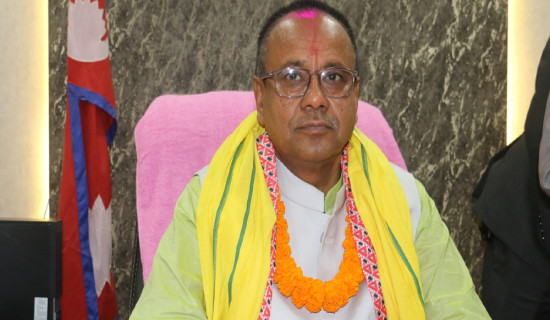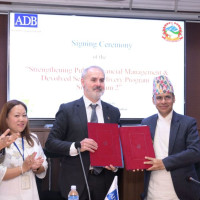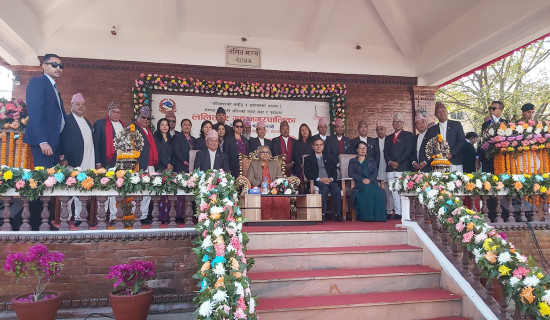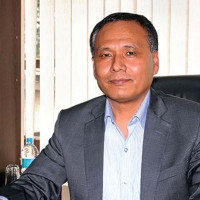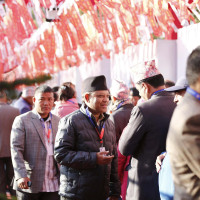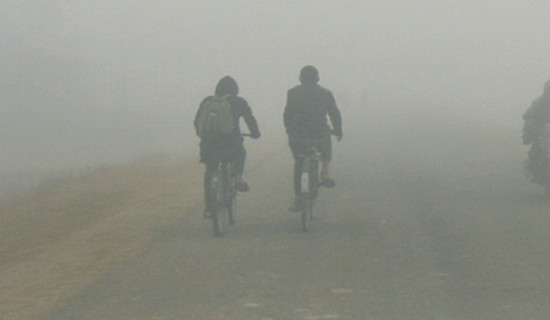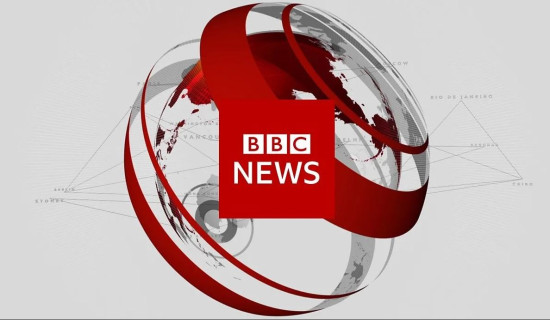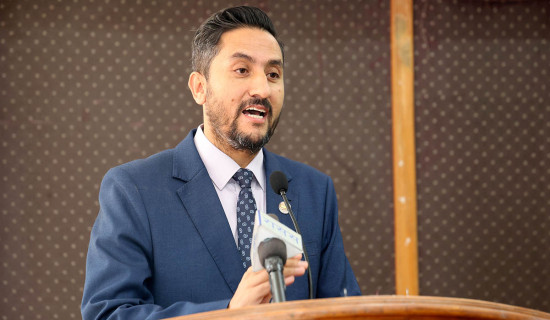- Wednesday, 17 December 2025
Federalism is not implemented effectively: Khanal
Phakphokthum Rural Municipality is located in the west of Ilam district. It was formed by merging five former village development committees—Phakphok, Amchok, Fuyetapta, Lumde and Ektapta—and Ward No. 9 of former Chamaita Village Development Committee. It is ethnically and culturally diverse, with the Limbu community being the predominant population. It is famous for its production of herbs and agricultural produce. Our correspondent Prem Adhikari interviewed Dipendra Khanal, chairman of the rural municipality who was elected from the CPN-UML. Here is what chairman said regarding the development of the rural municipality.
What is the current situation of the rural municipality?
We are at the beginning of a new fiscal year. We have completed projects and made payments. We are currently reviewing our work and holding discussions for new projects.
What are the plans for the upcoming fiscal year?
The programmes are similar to the past ones. As our rural municipality is primarily an agricultural area, we have focused on irrigation and prioritised agriculture. There is potential for irrigation but we lack infrastructure. Therefore, we emphasised irrigation and animal husbandry. We have given importance to road construction in partnership with the provincial and federal governments.
The rural municipality is still considered remote in the district. What visible development works have been done?
Major development projects are coordinated with the federal and provincial governments. Our municipal assembly decided to advance projects in coordination with both governments under the complementary scheme. In the upcoming fiscal year, 10 irrigation projects will be completed at a cost of Rs. 8.5 million. A bridge is being constructed over the Phakphok Khola to connect with the district headquarters. We are planning to construct a motorable bridge.
Mainly, villagers become isolated during the monsoon due to rise of water level in the Phakphok Khola. When will this problem end?
That situation still exists mainly affecting residents of Ward Nos. 1, 3 and 4. The roads to Ilam via Ghurbise Panchami, to Ranke via Kolbote and to Mangalbare or Damak via Gajurmukhi are all blocked during the monsoon due to the lack of bridges.
Another road exits to Ravi in Panchthar, but it's not passable beyond Ravi. Even the road at Panchami side gets blocked due to the river overflowing even after mild rains.
Vehicular movement halts due to the lack of bridge over the Phakphok Khola.
Why is the rural municipality lagging in infrastructure such as roads and bridges even seven years after local government took office?
The main reason is the high cost. The rural municipality has limited budget. Despite repeated requests to the provincial and federal governments, we don’t have projects. Now, with the complementary fund from the province, we are constructing a bridge over the Phakphok Khola. The cost of this project is beyond the capacity of the rural municipality, but we have taken the initiative.
What has been done in the health and education sectors?
There are major issues in the health sector. With the support of the federal government, a 15-bed hospital is under construction. However, doctors are unwilling to stay in the village, so we have arranged for 50 per cent grants for medical studies. We have a policy that doctors who study under this grant must serve in the rural municipality for a certain period. Previously, there was no ambulance service, but now it is operational.
Regarding the education sector, we are in regular discussions with stakeholders. There has been monitoring, but the expected results are not seen. The situation is good at the basic level schools, but some schools had to be merged in lack of students. We have not been able to improve secondary schools. It appears that the teachers in community schools lack confidence. All necessary facilities and infrastructure are available, but the quality of education has not improved. According to the recent SEE results, our municipality has the weakest performance in the district. There is also a lack of interest from parents in community schools. While the municipality is trying its best, we are still figuring out where we went wrong.
What are you doing for the development and marketing of the agriculture and livestock sectors?
In the agriculture sector, we are distributing improved seeds of fruits and vegetables, providing adequate irrigation facilities and coordinating with the sub-division forest office to produce and distribute saplings for free. The livestock sector has more potential. We have 145 dairy industries in operation. Products like ghee and chhurpi from these dairies are being exported to third countries. However, we do not have direct access to the market and are facing price fluctuations as the federal government is handling the market.
How is the coordination with the federal and provincial governments?
On a personal level, the coordination with both the federal and provincial governments is good. However, there is a policy issue not just with our municipality but with all other municipalities. Federalism has not been effectively implemented from the centre, failing also in financial federalism. Provincial government is responsible for strengthening local governments but it claims that the central government has not delegated authority to them. It seems like the local level government has become more like the erstwhile village development committees, implementing old programmes. When we prepared a budget of Rs. 690 million, the provincial and federal governments released only Rs. 55 million. Of this, Rs. 36 million was sent under conditional grants.



